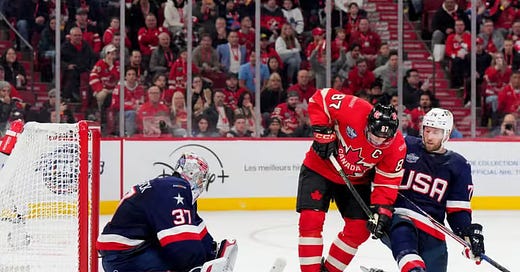USA’s D Makes Stifling Statement To Clinch Finals Berth
Montreal’s Bell Centre ice was littered with talent for Saturday night’s much-anticipated showdown between Team USA and Team Canada at the NHL’s Four Nation’s Face-Off.
Though each side was missing an elite skating defenseman, with American Quinn Hughes unable to participate due to an injury and Canada’s Cale Makar out sick, the speed and skill on display was unprecedented. Whereas when you watch regular season hockey, a player like New Jersey’s Jack Hughes stands out by often making his opposition look like they’re standing still, he just blended in among the high-level dervishes on Saturday, another pair of skates flying around the rink.
In the end, however, this was a game for the “Defense wins Championships” cliché mongers. In this case, Team USA’s stifling checking merely put it in the event’s Championship Game after Saturday’s 3-1 victory.
Team Canada will have an opportunity for a Thursday rematch if it can beat Finland in regulation on Monday when the tournament moves to Boston; otherwise, it will need help to advance, a stunning development for the vociferous crowd whose blood lust for their Southern neighbors was rewarded with three fights in the first nine seconds but was muted by the night’s end.
Many are calling Team USA defenseman Charlie McAvoy’s thunderous hit on Team Canada’s Connor McDavid the contest’s turning point. McDavid, the game’s top player by numerous measures, had opened the scoring by taking a defensive zone exit in stride and blowing past everyone at a speed reported at 24 mph before beating USA goalie Connor Hellebuyck with a roofed backhander. When McDavid attempted to generate another rush chance along the left wing boards, McAvoy laid his shoulder into him and sent him flying. About 30 seconds later, Team USA’s Jake Guentzel, taking a Jack Eichel feed on a two-on-two counter, tied the game with a rather soft goal on Team Canada netminder Jordan Binnington.
Make no mistake, Team Canada’s defense wasn’t at all leaky—NaturalStatTrick.com had the five-on-five high danger shot count at 12-5 in its favor—it just made the one mistake that proved to be the difference. As his club’s defense pair was changing off a second period shift, Sidney Crosby, whose 26-game winning streak while wearing the Team Canada sweater was busted, turned over the puck just inside the blue line. With a quick get-ahead flick from Matt Boldy, America’s Dylan Larkin was sent the other way on a virtual two-on-one. Larkin kept it himself and beat Binnington for the game winner with 6:27 remining in the frame.
Unheralded—and uncredited with an assist—on the play was Boldy’s Minnesota teammate Brock Faber, Team USA’s youngest player. Faber logged almost 25 minutes of ice time, mostly paired with Jaccob Slavin. The duo’s gap closing and active sticks ended foray after foray, including the one that preceded Larkin’s transition.
Team USA Head Coach Mike Sullivan used his more offensive-minded defensemen Adam Fox and Zach Werenski rather sparingly, with each logging around 13:45 of ice time at all strengths. McAvoy and Noah Hanifin got in the 18-20 minutes range while Slavin and Faber did the majority of the heavy lifting.
Slavin is so underrated. Devils fans have gotten a glimpse of the virtues of such a particular skillset when Brett Pesce, Slavin’s sidekick in Carolina for many years, came over as a free agent last offseason. Pesce has said that the two used to work constantly on getting sticks on pucks coming from any height and direction. While the sometimes viscous hitting took center stage (the league medium is a little over 21 hits per game, with Florida leading with 28 per game; Team USA laid out 34 hits on Saturday to Canada’s 29), these more subtle acts of defending were perhaps even more effective.
While Hellebuyck was credited by NST with 2.36 saves above expected, he had plenty of help from those who moved bodies and cleared rebounds away from the net front. Canada’s Grade A chances seemed to be those that Hellebuyck could parry with disciplined positioning as opposed to having to fight off screens and deflections. Team Canada couldn’t muster a shot on goal after pulling Binnington for an extra attacker in the final minutes before Guentzel ended matters with an empty netter.
The Tkachuk brothers Matthew and Brady, who instigated the opening melees perhaps in homage to their father and 1996 World Cup of Hockey villain (from Canada’s perspective) Keith, were the obvious story line along with goal scorers Guentzel and Larkin. Lost in the shadows was the lockdown defending that frustrated the Canadian faithful, who will one day be forced to begrudgingly admit that world hockey power must be shared with a country whose game they have long disrespected.



